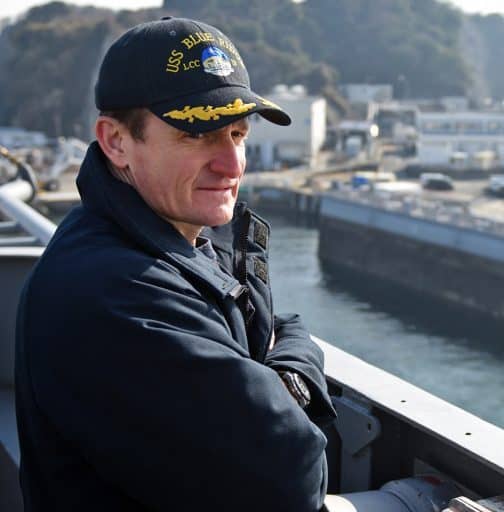Is the US Navy now more about politics than maintaining an effective fighting force? Recent events certainly suggest it is.
By now everyone knows the story of how Captain Brett Crozier of the U.S. Naval Aircraft Carrier Theodore Roosevelt was fired by Acting Secretary of The Navy Thomas Modley for writing him a letter, which was leaked to the press, insisting Crozier be allowed to make an unplanned docking to off-load sailors on Guam who had contracted COVID-19.
Modley said Crozier was not fit for command because he did not take proper steps to ensure that no leak could occur. Modley followed up with a vitriolic speech to the ship’s crew, and then resigned under pressure a few days later. It shocked the nation and, as of this writing, over 400,000 Americans have signed a petition asking that Captain Crozier be reinstated.
Few of us understand today’s Navy well enough to see how such mismanagement could almost be expected. Thanks to two retired Navy Captains, James L. McClane and Kevin Eyer, writing last October in the Navy’s Maritime Executive we can begin to understand.
It is really all about the worst kind of politics taking over what once the world’s greatest sea power.

Captain Brett Crozier
When Americans think of our Navy, we invariable see a fighting fleet at the ready to protect our nation with battleships, aircraft carriers, destroyers, submarines, cargo ships and the many service craft that keep them all in fighting readiness. The lead author of this article, Dr. Jay Lehr, had the honor of serving on a number of them during seventeen years on active and reserve duty.
The crux of the problem today is an unprecedented increase in politically-appointed high ranking naval officers. They are known as Flag Officers, having the right to fly the Navy flag wherever they may be. They include Admirals of all levels who have risen above the senior sea-going rank of Captain. In 1997, the total number of these senior naval officers, reasonably equaled the number of active ships plying the ocean. Today as the number of ships has shrunk by nearly a third, the number of Flag Officers has increased an incredible 32-fold.
Imagine that we fought World War II with only the same number of flag officers as we had ships. The Captains of these ships were men trusted to run the Navy with paper, pencils, dial telephones, voice radio, flashing lights and good seamanship. Today a good case can be made that our Navy could not stand up to the Navy of the 1940s. One only has to look to a significant number of Navy ships colliding in recent years.
Two primary reasons for the expanding bureaucracy are that most Admirals want an expanding work force and these officials make work for each other. In 2010 the then Secretary of Navy, Robert Gates, called for the elimination of 100 Flag Officers in what he called his “Efficiency Initiative”. He was completely thwarted at the Pentagon in this effort.
In May of 2013 the General Accounting Office (GAO) found the number of support staff increased by 50% between 2001 and 2012. This created added distance between commanders and warfighters. Secretary Gates said that:
“in some cases, the gap between me and an action officer could be as high as 30 layers resulting in a bureaucracy with the fine motor skills of a dinosaur”.
The Navy is ready with excuses. They are required by law to have joint exercises with other services. There is also an increased focus on working with other nations. Proof of these needs are missing as the Navy did all these things in World War II and we won without a glut of senior officers.
There is no question that the military is more sophisticated today than in the past but it does not come close to justifying what it has become. For example, why is there no statistical correlation with active ships or the number of sailors?
This disproportional growth in flag officers is very worrisome as it has corresponded with a decline in readiness which appears to have been unnoticed until recently when many were taken by surprise that ships have been poorly maintained, trained and sailed without required certifications, all of which was documented by Captains McClane and Eyer in their Maritime Executive article.
It seems the Navy has less and less to do with the active fleet and more to do with politics. A case in point was raised by Asia Times in “Blunders eroded US military edge in Pacific” (September 18, 2019), in which they described the results of The United States Studies Center at the University of Sydney (Australia) report, “Averting Crisis: American Strategy, Military Spending and Collective Defense in the Indo-Pacific.” The Times writes, “The report correctly describes America’s eroded military edge in the Indo-Pacific – such that the Chinese People’s Liberation Army even outmatches US forces in certain areas.” The Asia Times then asks a poignant question:
“But while the US has a strong hand there’s something missing, and the University of Sydney report overlooks it as well. That is the human element and how inept leadership – military and civilian – got the US military into the current crisis in the Indo-Pacific. How else does one explain a PACOM commander declaring climate change his biggest worry – not the People Liberation Army – and a Navy secretary prioritizing “green fuels” over arming US ships with anti-ship missiles that go as far and as fast as the Chinese navy’s missiles?”
It would appear that the cause of ineffective leadership may lie with criteria used to select flag officers over many years. Less important is sustained superior performance at sea and more a matter of what you could do for us in Washington, DC if we make you an Admiral.
McClane and Eyer maintain
“it is commonly understood that, regardless of record, an officer without substantial experience in Washington is unlikely to move beyond a first command. Those officers stay with the fleet. Without also keeping a weather eye on good Washington tours and an associated accretion of, powerful advocates, end up being viewed by boards as insufficiently broad which is tantamount to non-selection.”
It seems to be all about influencing a budget, increasing manpower, connections to industry and Congress, how to employ power, loyalty to Navy policy, not how to defend the nation. Maintaining a ship, anti-submarine warfare, tactical warfare appear to be relatively unimportant.
This surely led to the disgraceful manner in which Captain Brett Crozier was handled. Reducing the power of a now entrenched bureaucracy is never easy, but if we ever have to fight on the seas it must be done.


























Mr. Tom Harris and Dr. Jay Lehr assert the criteria used to select flag officers “…surely led to the disgraceful manner in which Captain Brett Crozier was handled. However, Captain Crozier was fired by Acting Secretary of The Navy, Thomas Modley. Mr. Modley is civilian, political appointee who was never a flag officer in the Navy.
After an investigation the chief of naval operations, Adm. Michael M. Gilday, and the acting Navy secretary, James McPherson have recommended Captain Crozier be reinstated. Joint Chiefs Chairman Gen. Mark Milley advised Esper to defer a decision and instead open a fuller investigation into the matter.
Dr. Lehr and Mr. Harris maybe right about problems with the criteria used to select flag officers but that had nothing to do what the disgraceful manner in which Captain Brett Crozier was and continues to be handled.
I agree the Navy is way too top heavy, and is sacrificing quality to be politically correct, as a result the level of competence is dismal. Blame Congress for that. Furthermore, Obama filled the military with PC generals and admirals and it will take time to get rid of them. As for Crosier, he knew how things are done in the Navy, and chose to ignore it, although given the state of thinking in the Navy, I can certainly understand it. However, if he’d been an enlisted man there would have been no outrage at his treatment, and he would have had the book thrown at him.
Make no mistake about this, “military justice” has little to do with justice……when you’re an enlisted man…..and little to do with justice if you’re an officer. There is unending favoritism toward the officer corps when it comes to “military justice”. The movie A Few Good Men demonstrates how the system is rigged in favor of officers, especially senior officers, to the detriment of enlisted men. The term military justice is an oxymoron.
I despised the officers when I was in the Navy and I still despise them fifty years later.
Unlike Mr. Tom Harris and Dr. Jay Lehr, you assert Captain Brett Crozier is responsible for his being fire. You imply he is an some kind of Obama appointee. However, he was commissioned as a Naval Officer by George H. W. Bush. He was assigned command of the nuclear aircraft carrier USS Theodore Roosevelt on November 1, 2019.
Captain Brett Crozier followed the chain of command. https://blog.usni.org/posts/2020/04/17/return-crozier-to-the-roosevelt-restore-faith-in-the-navy After an investigation the chief of naval operations, Adm. Michael M. Gilday, and the acting Navy secretary, James McPherson have recommended Captain Crozier be reinstated but its been blocked.
Unlike you, the sailors on the USS Theodore Roosevelt respect their Captain. https://www.sandiegouniontribune.com/news/military/story/2020-04-03/hundreds-of-sailors-on-carrier-theodore-roosevelt-cheer-their-fired-commander-as-he-leaves-the-ship
Captain Brett Crozier was mistreated by a political appointee but Captain Crozier was right. https://www.nbcsandiego.com/news/local/uss-theodore-roosevelt-covid-19-cases-exceed-1100-navy-to-decrease-reporting/2316749/